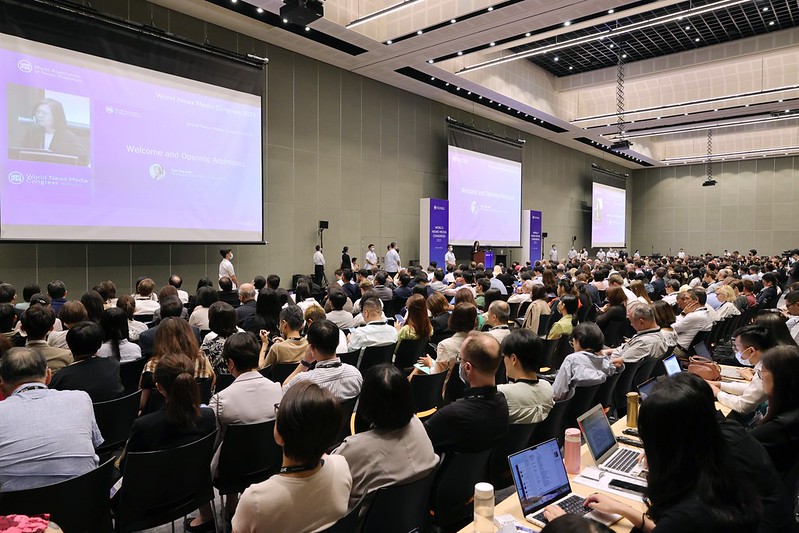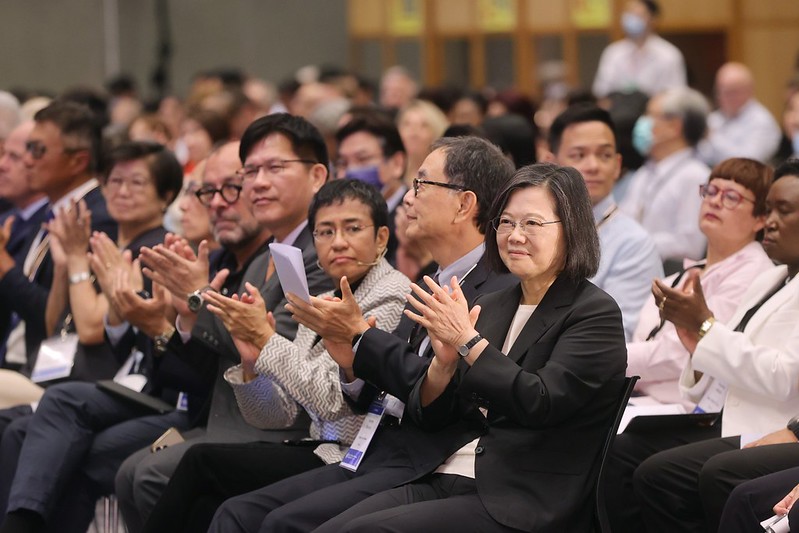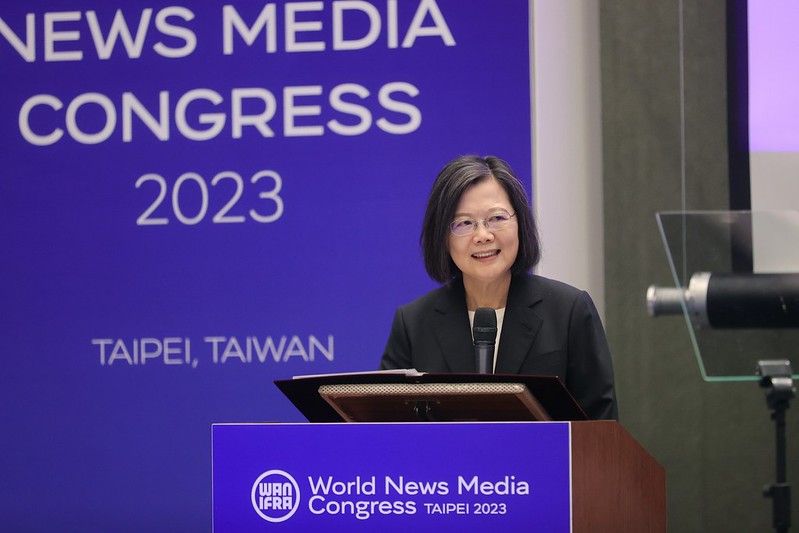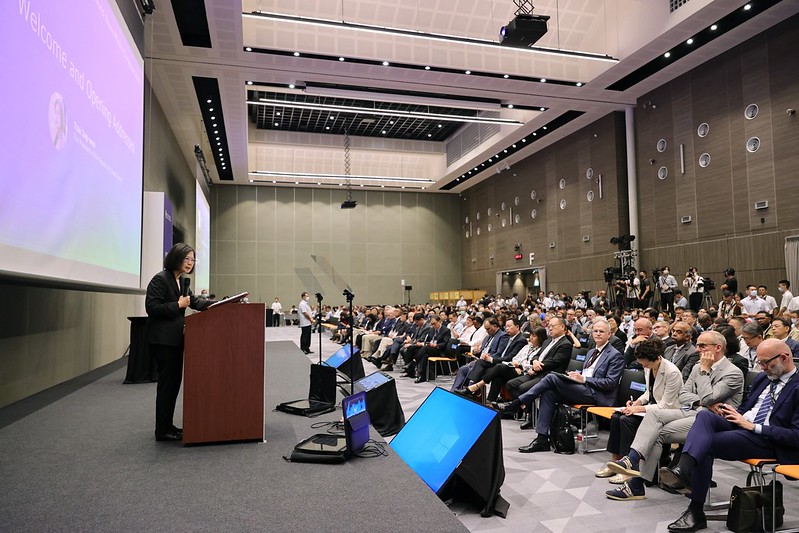News & activities
 News releases
News releases
On the morning of June 28, President Tsai Ing-wen attended the opening of the World News Media Congress 2023. In remarks, President Tsai stated that Taiwan has become home to many international media professionals, which is testament to Taiwan's efforts to safeguard media freedom and the right to free speech, and shows the world how deeply Taiwan values this important pillar of democracy. Noting that disinformation campaigns have become one of the most difficult challenges for democracies, the president said that Taiwan has developed ways to counter them, and has been sharing its experience with international partners and friends. She added that the government and civil society forces should help build the capacity for every individual to identify true, false, or misleading information, while credible third-party organizations are also needed for fact-checking as part of a whole-of-society effort. Acknowledging that this is the way to protect freedom of speech in a democracy, the president emphasized that the media can and should have an important role to play in this.
President Tsai reiterated that media freedom and information integrity affect us all and that disinformation directly influences our way of life. She also said that we should come together to discuss the most pressing issues facing the industry and democracy.
A transcript of President Tsai's remarks follows:
It is my pleasure to join you all today. And, I am pleased to see, after a two-year delay due to the pandemic, around 600 media professionals and leaders from more than 80 countries are here in Taiwan. I am also happy to learn that Taiwan is the place WAN-IFRA (World Association of News Publishers) has chosen to host its congress on its return to Asia; its first time back in the region since 2013.
In the last few years, Taiwan has become home to many international media professionals. Along with your presence here, this is testament to Taiwan's hard work on safeguarding media freedom and the right to free speech. It also shows the world how deeply Taiwan values this important pillar of democracy.
I also want to extend a special welcome to Ms. Maria Ressa, Nobel Peace Prize laureate and a champion of information integrity and media freedom. Actually, Ms. Ressa gave inspiring opening remarks at the World Movement for Democracy's Global Assembly last October in Taipei. As Ms. Ressa eloquently put it, "We are at the last two minutes of democracy," and "if we don't have integrity of facts, we won't have integrity of democratic processes like elections."
And this is the very reason we are gathered here today. Events like the World News Media Congress give us the platform to discuss important topics such as the media's relationship with generative AI, how to form relationships with digital innovators and tackle the challenges posed by disruptors, and how to sustain professional journalism in this fast-changing digital environment.
I am also pleased to learn there will be a working lunch to celebrate the success of outstanding woman newsroom leaders.
Taiwan has been rated as one of the freest countries when it comes to press freedom. In Freedom House's report on Freedom in the World this year, Taiwan scored 94 out of 100. It was rated as "free" in the region. Under the "Civil Liberty" category, Taiwan received a perfect score for freedom of expression and belief. Its news media is described as "generally free, reflecting a diversity of views and reporting aggressively on government policies."
According to the Economist Intelligence Unit's report last year, Taiwan ranked as the leading full democracy in Asia. This year, Taiwan also moved up three spots, to 35th out of 180 countries, in the latest World Press Freedom Index by Reporters Without Borders. This achievement is the result of sacrifices made by democracy advocates during Taiwan's authoritarian era and decades of hard work from our government and members of our vibrant civil society. However, in recent years, there have been authoritarian forces targeting this freedom we have worked so hard to achieve.
There are constant attempts to extend influence on the Taiwanese media environment. There are also well-funded, large-scale disinformation campaigns making extensive use of internal and external propaganda to influence Taiwan's democracy. The freedoms of the net, media, and social media enjoyed by Taiwanese citizens are being utilized to erode Taiwan's democracy.
According to the Varieties of Democracy, or V-Dem, project from Sweden, Taiwan has exceeded every other country in the world on the amount of false information other governments disseminate within its borders for 10 years in a row. The goals of such disinformation campaigns are multifold. They seek to further polarize our society, pitting citizens against one another. They also attempt to corrode trust in democratic institutions and government officials. In addition, they aggressively promote the narrative that democracy is chaotic and inefficient, therefore, a less democratic option should be adopted.
Such disinformation campaigns have become one of the most difficult challenges for democracies like Taiwan. The rise of AI has benefited us all, but it also allowed disinformation to be generated and distributed at an unprecedented rate. This makes deterring disinformation much more difficult. The question then is, how do we counter disinformation while safeguarding the right to free speech?
This means a democracy has limited means to deal with disinformation campaigns for concerns of causing harm to freedom of speech. Instead of limiting, restricting, controlling, or even prohibiting the free flow of information, we have to respect people's right and give them the opportunity to make their own decisions as to whether a particular piece of information is to be believed.
In this case, the government, together with civil society forces, is to help build the capacity for every individual to identify true, false, or misleading information. Therefore, public education or raising public awareness is very important. What is also important is the supply of accurate, timely, and adequate information, and the guidance to think and consider from different perspectives, for each individual to make his or her own decision. We also need credible third-party organizations for fact-checking. In other words, we are talking about a whole-of-society effort. Working together may be time and resource consuming, but this is the way we protect freedom of speech in a democracy. I want to emphasize here that the media can and should have a role, perhaps a huge one, to play in all of this.
In Taiwan, we have developed ways to counter disinformation campaigns. These efforts require all parts of the society to act together. Since timeliness and transparency are key to an effective defense against disinformation, our government agencies hold regular news briefings and release real-time official clarifications to the public.
The effort doesn't stop here. Taiwan's vibrant civil society and civil tech community have contributed immensely to combating disinformation. Some civil society organizations publish thoroughly researched and detailed reports on disinformation campaigns. They also help identify playbooks on authoritarian information manipulation. At the same time, they have developed media literacy lesson plans and traveled around Taiwan to educate citizens from all generations. The civil tech community also developed chatbots for chat applications. This made fact-checking so much easier for Taiwanese users.
We are also working internationally, through the Global Cooperation and Training Framework (GCTF). This is a platform that allows Taiwan to share its expertise on relevant issues with democratic partners from around the world. In the past few years, Taiwan has held media literacy workshops with countries such as the United States, Japan, Sweden, the UK, and Italy. And we are expanding the locations where GCTF workshops are held.
Through these efforts, Taiwan has been sharing its experience in combating disinformation with our international partners and friends. But this is not the only issue to which Taiwan contributes in the region and the world. The maintenance of regional security has been a significant part of Taiwan's overall government policy. We are fully committed to collaborating with our neighbors and democratic partners to prevent armed conflict in the Taiwan Strait as well as in the East and South China Seas.
Taiwan has also launched initiatives to make its military better prepared for both present and future challenges. These initiatives are meant to maximize Taiwan's self-sufficiency and preparedness, and to demonstrate that we are willing to bear our share of the burden and do not take our security partners' support for granted.
Taiwan would never seek military confrontation. It has been working for peaceful, stable, predictable, and mutually beneficial coexistence with its neighbors. But it will also defend itself, particularly, working diligently to counter disinformation campaigns when its democracy is threatened.
To close my talk today, I want to reiterate the fact that media freedom and information integrity affect us all. And disinformation directly influences our way of life. Coming together to discuss the most pressing issues facing the industry and democracy is what we should be doing now.
Lastly, I hope you have a productive congress. But please also enjoy your time in Taiwan, and take some time to experience our culture, scenery, and, of course, delicious food. Now, I also want you to have the opportunity to meet with our friendly people as well. And I want to thank you for coming to see us in Taiwan. Thank you.
Among those attending the event were WAN-IFRA President Fernando de Yarza López-Madrazo and United Daily News (UDN) Group Managing Director George K. Shuang (項國寧). UDN Group Chairman Duncan Wang (王文杉) attended via videoconference.






